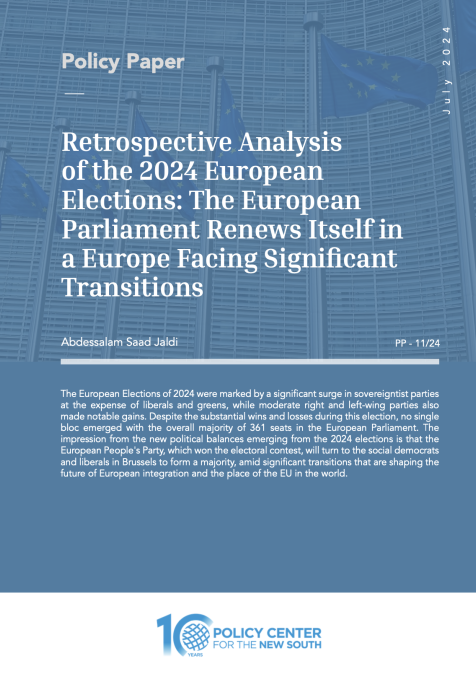Publications /
Opinion
After the European Parliament cleared the 26 candidates proposed by Member States to form the European Commission for 2024-2029, the new European super-ministers will take up their functions on 1 December, with a revised portfolio structure. Where does Africa fit into this new organizational chart of the European Commission?
Jozef Síkela, a Czech banker with a professional career in Austria, Slovenia and Ukraine, lately serving as his country’s Ministry of Industry, has been appointed Commissioner for International Partnerships. He will oversee the EU’s vast development cooperation portfolio, including the management of most of the Neighbourhood, Development and International Cooperation Instrument, with a total budget of 70.8 billion euros for 2021-2027, making the EU the largest global donor. Since financial assistance projects articulate EU cooperation with African countries, this Commissioner and his services at DG INTPA will serve as the primary interlocutors for African countries at the EU, working closely with European Union Delegations under the supervision of the new High Representative for Foreign Affairs and Security Policy, Estonian Kaja Kallas.
In her letter of mission addressed to the new Commissioner to set out his mandate, President of the European Commission Ursula von der Leyen outlined the priorities for this key portfolio. The Commissioner’s first task is to deploy and scale up the Global Gateway initiative, launched in 2021, to “ensure it puts forward the most attractive integrated offer to our partners, including on infrastructure investment, trade and macro-economic support.” This initiative is designed to compete with China’s Belt and Road Initiative, aiming to develop a global network of infrastructure to capture international merchandise flows and raw materials.
For Africa, the Global Gateway launched the Africa-Europe Investment Package, which is expected to mobilize approximately 150 billion euros in public and private investment by 2027—half of the total global budget. These investments will be directed toward sustainable infrastructure projects (digital, energy, transport), as well as initiatives in health, education, skills, and efforts to address climate change and environment challenges. In his hearing before the European Parliament, the new Commissioner emphasized the central role of this initiative in his mandate: “I was selected to turn the Global Gateway from a start-up into a scale-up,” reflecting his background as a finance specialist.
However, as inferred from his remarks during the hearing, his approach may not lead to significant changes: “If you see the basic rules on what to do with a start‑up in order to have a scale‑up, in first place you will find ‘'better communication and marketing. So it starts that we have to talk more about the things we are doing, about the things we are doing right, to maybe finish certain showcases where we can achieve that basically the receiver states will become our ambassadors and to maybe even make a comparison with our rivals' approach.”
In terms of bilateral cooperation with partner countries, the letter of mission states: “You will work on building comprehensive partnerships with an integrated approach so that economic, humanitarian, development, peace and security policies all contribute to strengthening these partnerships. These will notably address the root causes and key drivers of irregular migration in partner countries and fight the networks of smugglers.” This formalizes the irregular migration control conditionality that has been a cornerstone of the EU’s development cooperation, as well as trade and investment relations, with partner countries since 2016.
37 Words
The mission letter also outlines the geographic scope of the new Commissioner’s mandate: Africa, Central Asia, Asia and the Indo-Pacific, and Latin America and the Caribbean. Africa is mentioned explicitly only once: “You will play a leading role in strengthening our mutual partnership with Africa, ensuring support to bridge the investment gap through Global Gateway, and working together to mutually address the concerns of our partners across the continent.” This amounts to barely 37 words or three lines in a letter that stretches to 2,500 words and seven pages. Notably, there is no explicit reference to the Africa-EU Partnership, despite it being listed as “a key priority for the Commission” on its official webpage.[1] The new Commissioner was more forthcoming in his confirmation hearing, dedicating more than one page (out of 13[2]) to his plans for EU-Africa cooperation.
Paradoxically, Africa is slightly more prominent in the mission letter of the new High Representative for Foreign Affairs and Security Policy and Vice-President of the European Commission. In a section on “A more strategic approach to our neighbourhood and partnerships,” there are a couple of more concrete references to Africa: “You will ensure new impetus in our mutual partnership with Africa ahead of the next EU-African Union Summit in 2025, working closely with the Commissioner for International Partnerships. You will work on a renewed approach to the Sahel region, given the growing risks of insecurity and instability in the region.”
However, when considered alongside the rebranding of DG DEVCO as DG International Partnerships in 2021,[3] the new structure signals the EU’s realignment around its own interests, rather than development or poverty reduction as its primary strategic objectives. This is made explicit in the mission letter’s first paragraph, which describes the new Commissioner’s assignment: “In recent years, the EU has maintained its unwavering commitments on development and on the eradication of poverty, while taking a more a more assertive approach in aligning its interests with its partnerships in a more contested and unstable world.” African countries, be advised.
The profiles and mission letters of the new European Commissioners can be found here: https://commission.europa.eu/about-european-commission/towards-new-commission-2024-2029/commissioners-designate-2024-2029_en
[1] https://international-partnerships.ec.europa.eu/policies/africa-eu-partnership_en.
[2] https://hearings.elections.europa.eu/documents/sikela/sikela_writtenquestionsandanswers_en.pdf.
[3] See the opinion piece by Iván Martín (2021) « La disparition de DG DEVCO : mauvais temps pour la coopération internationale au développement », 18 January 2021, https://www.policycenter.ma/opinion/la-disparition-de-dg-devco-mauvais-temps-pour-la-cooperation-internationale-au-developpement.









